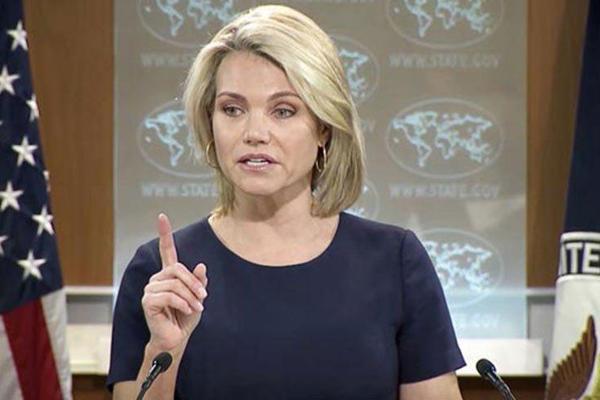US voices concern over ‘humanitarian situation’ in Afrin
WASHINGTON


The United States has voiced concern over the humanitarian situation in Syria’s Afrin region, claiming that thousands of “displaced people” are not allowed to return their homes.
Turkey launched “Operation Olive Branch” on Jan. 20 to clear People’s Protection Units (YPG) militants from Afrin. On March 18, Turkish-backed troops declared full control of Afrin town center, which had been controlled by the YPG since 2012.
“We have expressed grave concern about the humanitarian situation in Afrin over recent weeks and months. That remains a concern of ours today,” U.S. Department of State spokeswoman Heather Nauert said in a briefing on May 3.
“We have been watching this situation very carefully in Afrin. 140,000 people have been displaced from Afrin, and as far as we can tell, they are not being allowed back in their homes and communities,” she added.
“We call on all relevant sides, all relevant actors operating in the northwest—that includes Turkey, Russia, and Syria—to provide access for international humanitarian aid organizations and to allow for people to come home. They cannot be forced back in their homes, but we would like for them to be brought home or to be able to head home safely and as soon as possible,” Nauert said.
Freedom of press
When asked about the freedom of the press in Turkey, the spokeswoman said the U.S. supports the goal of improved media freedom in Turkey.
“We raise the issue directly with the Turkish Government on many occasions. We continue to highlight that. We also do it not only face to face with our counterparts but also through various multilateral institutions.” she said.
“There are more journalists jailed in Turkey than in any other country around the world. That is a tremendous concern,” Nauert added.
Turkey’s purchase of Russian missiles
During the presser, Nauert also responded to questions regarding Turkey’s plans to purchase the Russian S-400 air defense system.
According to the spokesperson, Washington has “serious concerns about Turkey’s potential acquisition of the S-400 system.”
“Under NATO and under the NATO agreement, which of course, Turkey is a NATO member, you’re only supposed to buy, they are only supposed to buy, weapons and other material that are interoperable with other NATO partners,” Nauert said.
“We don’t see that as being interoperable. We obviously, though, have a robust defense trade relationship with the Government of Turkey, and we will continue to raise our concerns with them on any kind of pending sales or anything of that nature,” she added.
Last December, Turkey announced that it had concluded an agreement with Russia for the purchase of two S-400 systems by late 2019.
On April 3, President Recep Tayyip Erdoğan and Russian President Vladimir Putin said in Ankara that they had agreed to shorten the duration of the systems’ delivery. The delivery is expected to start in either late 2019 or early 2020.
Russia has started production of the S-400 air defense system for Turkey, manufacturing company Rosoboronexport General Director Alexander Mikheev said on April 25.
